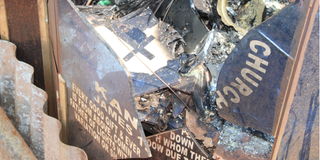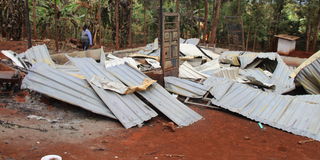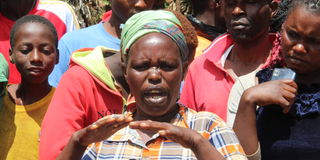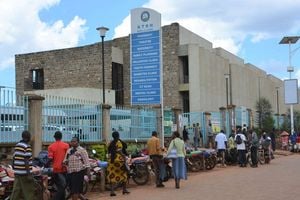
Parts of a church that was torched by residents of Kanjai in Tigania West, Meru County.
What started as a branch of the East African Pentecostal church several decades ago turned into a place of radicalisation and horrific acts that led residents of a village in Tigania West, Meru county to burn down their 'house of God'.
The Kanjai church in Limauru sub-Location started with adherents being ordered to remove their clothes and ‘adorn the birth suit’ as a sign of ‘supplication’, to shaving women’s pubic hair and depositing it in a special bag.
Then it graduated to worshipers being asked to surrender their chicken, goats, sheep and even cows. They were also asked to contribute money and those who refused were ordered out of the church.
What was most shocking, according to the residents, was recent activities their ‘pastor’ engaged in, bordering on cultism.
He is said to have slaughtered a goat and selected some people who would drink the blood in rituals he claimed were intended to purify them. He poured the rest on the floor of the church and ordered adherents to ‘roll on the blood-soiled floor’ while naked.
The 'pastor' also instructed worshipers to remove their shoes and wash their feet. The water would be used for drinking and cooking tea that they would all share in the church which had about 100 people most of them women and children.
This was the culmination of what residents now believe was intended to initiate them into a cult.
What the objective of the church leader was is the subject of investigations being carried out by the Directorate of Criminal Investigations with the view to unearth what would have been the next stage.
Area sub-chief Joseph Muriuki said although the culprit had not been arrested, “detectives are on it.”

Parts of a church that was torched by residents of Kanjai in Tigania West, Meru County.
“We have established that this is not the first time he has found himself on the wrong side of the law with his preaching. He started at a neighbouring village more than a decade ago but residents there chased him away after which he pitched camp at Kanjai,” he said.
Bishop Samuel Muguna, the head of the East African Pentecostal Church, confirmed that they had received complaints from members of the community about the pastor.
He said following the complaints the church carried out investigations and established that it was true he was preaching "a doctrine that is out of the EAPC church teachings. In fact we have since excommunicated him from the church," Bishop Muguna said in a phone interview.
'Funny behaviour'
Bernard Kinyua, a former vice chairman of the church, narrated how he bolted out of the church when he discovered that the 'pastor' was leading them astray “by not preaching God’s teachings”.
He said the church was operating well for years but when the pastor was posted there in 2017, things changed. At one point he allegedly told the congregation that he would travel out of the country for two months but did not disclose his destination.
“That was around 2018. When he came back we started seeing his funny behaviour. The first time I found a chicken slaughtered in the church I told him off. But he ordered me to leave. Since that day I did not go back to the church,” Mr Kinyua said.
Church services were conducted in the dead of the night, according to some members of the congregation we spoke to.
'Naked women'
“I am a victim. I used to attend the church and one day when I arrived at around 11am I was ordered to go to a room that was reserved for the pastor.
"There, I found three naked women. My 17-year-old daughter was ushered in and they asked me to breastfeed her like a child which I did. She was also asked to undress and the pastor ordered me to shave her pubic hair but I refused,” said Christina Nthama.

Christina Nthama, a resident of Kanjai in Tigania West narrates her experience in a cult-like church.
The residents said they reported the matter to police whom they accused of delaying to arrest of the man and it was out of this anger that they descended on the church building on Monday and razed it to the ground.
The Nation's team visited the village and found the church had been torched.
A generator here, burnt microphones there and plates and cooking pots strewn all over the place, signalling that people used to live in the church.
Mr Muriuki, the sub-chief said several witnesses had recorded statements with the police.
The residents also claimed that the 'pastor' forged documents claiming that he was the owner of the quarter-acre piece of land they donated to establish the church over 30 years ago.
“They have accused him of altering documents of the land. Once there is concrete evidence he will face the law,” Mr Muriuki said.
“The police need proper evidence since issues of faith and alleged radicalisation are tricky,” he added.
However, residents have threatened to take the law into their hands if the man will not be arrested.
Also read: Tearful teen tells of forced conversion to Christianity and pain of losing mother to Shakahola cult
“We are the ones who know what he has been doing to our women and police should move swiftly otherwise we will teach him a lesson,” said Julius Kailemia, a resident.
“We don’t want anything to do with a devil who claims to be a pastor. We want him out of this village and appeal to the government to help us recover our land,” he added.
The incident comes after the ad-hoc committee tasked to investigate the proliferation of religious organisations and circumstances leading to the deaths of over 400 people in Shakahola made far-reaching recommendations aimed at protecting Kenyans from activities of cult leaders.
Paul Mackenzie, who is facing murder charges, is accused of radicalising adherents and leading them to fast to death with the promise of 'meeting Jesus'.
The report proposed several measures, including the re-registration of all religious institutions under strict vetting procedures.









